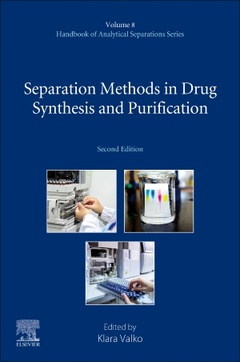Description
Separation Methods in Drug Synthesis and Purification (2nd Ed.)
Handbook of Analytical Separations Series
Coordinator: Valko Klara
Language: English
Subjects for Separation Methods in Drug Synthesis and Purification:
Keywords
analytical HPLC; fast generic HPLC; capillary electrochromatography; CEC; coupled chromatography; mass spectrometry; combinatorial libraries; optimization strategies; CZE; computer-aided HPLC; Quality Control; process chromatography; automated preparative HPLC; liquid chromatographic enantioseparation; thin-layer chromatography; quantitative structure- retention relationships; QSRR; capillary electrophoresis; physicochemical properties; surrogate biological processes; biomimetic HPLC
788 p. · 15x22.8 cm · Paperback
Description
/li>Contents
/li>Readership
/li>Biography
/li>Comment
/li>
Separation Methods in Drug Synthesis and Purification, Second Edition, Volume Eight, provides an updated on the analytical techniques used in drug synthesis and purification. Unlike other books on either separation science or drug synthesis, this volume combines the two to explain the basic principles and comparisons of each separation technique. New sections to this volume include enantiomer separation using capillary electrophoresis (CE) and capillary electro- chromatography, the computer simulation of chromatographic separation for accelerating method development, the application of chromatography and capillary electrophoresis used as surrogates for biological processes, and new developments in the established techniques of chromatography and preparative methods.
Preface Klara Valko
1. Comparison of various modes and phase systems for analytical HPLC
Pavel Jandera
2. Fast-generic HPLC methods
Ian M. Mutton
3. Advances in capillary electrochromatography
José Luís Dores-Sousa, Jelle De Vos, Debby Mangelings and Sebastiaan Eeltink
4. Coupled chromatographyemass spectrometry techniques for the analysis of combinatorial libraries
Steve Lane
5. Experimental design-based optimization strategies for chromatographic and capillary electrophoretic separations
J. Viaene and Y. Vander Heyden
6. Computer-aided HPLC method development for quality control of complex drug mixtures--An application example for DryLab
Halina Katsialevich, Hans-Jürgen Rieger, Imre Molnár and Arnold Zöldhegyi
7. The flexible application of automated preparative purification platforms within drug discovery
Jennifer Kingston, Neil Sumner, Katie Proctor and Elisabetta Chiarparin
8. Strategies for the development of process chromatography as a unit operation for the pharmaceutical industry
Drew Katti
9. Recent developments in liquid and supercritical fluid chromatographic enantioseparations
Debby Mangelings, Sebastiaan Eeltink and Yvan Vander Heyden
10. Basis and pharmaceutical applications of thin-layer chromatography
Huba Kalász, Mária Báthori and Klára Valko
11. Recent advances in quantitative structureeretention relationships
Roman Kaliszan
12. Capillary electrophoresis for drug analysis and physicochemical characterization
Susana Amézqueta, Xavier Subirats, Elisabet Fuguet, Clara Ràfols and Martí Rosés
13. Application of HPLC measurements for the determination of physicochemical and biomimetic properties to model in vivo drug distribution in support of early drug discovery
Klára L. Valkó
a wide range of professionals from all areas of the chemical and pharmaceutical industries: skilled practitioners in the field of separation science; professionals working in the pharmaceutical industry; academic researchers postgraduate level and above
- Features descriptions and applications of all separation methods used in the pharmaceutical industry
- Written by the leading scientists in their respective fields, providing solutions for a wide range of industrial separation problems encountered within the pharmaceutical industry
- Thoroughly updated with brand new separation science techniques and the latest developments in the established techniques of chromatography




